
All ten of us are back in the States, no worse for wear. Going to the World Social Forum was a very important thing for me. The last workshop I went to was an overview of the recent WTO meeting in Hong Kong, and what went wrong. It was hosted by the kindly Walden Bello, of Focus on the Global South.
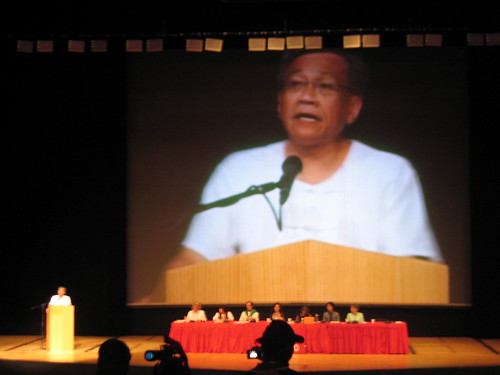
The day after the WTO talk, Jade, Jonah, Adam, a generous Venezuelan named Natalia, and I climbed a mountain named Avila. We walked from the center of the city to its peak. After making our way down in a jeep, Natalia took us to her home for a delicious meal of Pabellón, beers, then coffee.
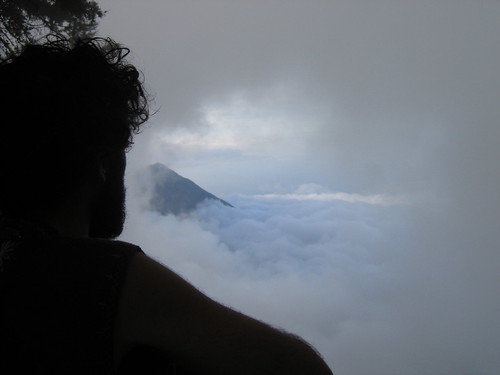
This is a picture of urban permaculture in Caracas that I failed to post previously.
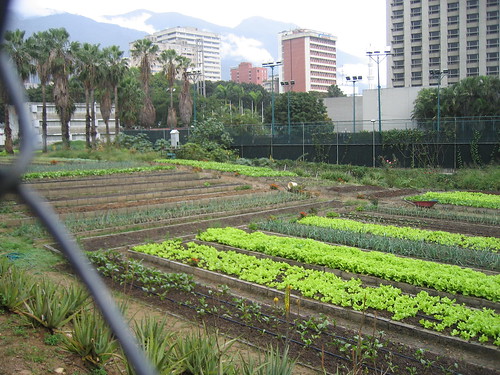
And a picture of a building at night. The top floors had a fire that we were told was caused by opposition to the Chavez governemnt. I am not sure that this is true now.
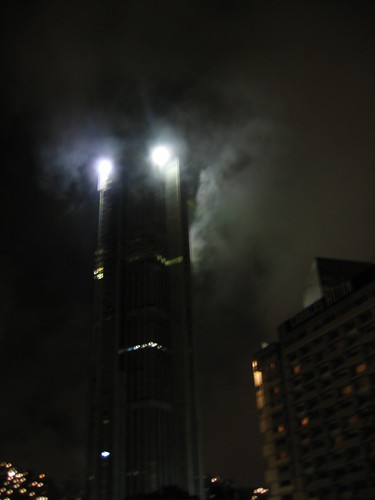
This was the press room.
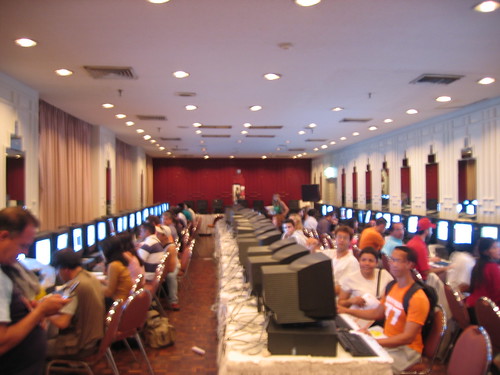
In a comment posted earlier, someone asked who the Cuban Five were. On the subject of comments, I'm sorry that they were not anonymous, this was unintentional. On the subject of the Cuban Five, they are Gerardo Hernández, Ramón Labañino, Antonio Guerrero, Fernando González and René González. They were in Miami investigating possible anti-Castro terrorists, the kind the US protects. They are now serving four life sentences after being convicted in a shameful display of McCarthyist posturing. The Five never threatened the US, possessed weapons, or spied on the US government. They were simply trying to prevent terrorism that would otherwise go unpunished or unimpeded by the USA.
It's hard coming back to the states and being greeted by "information" like this.
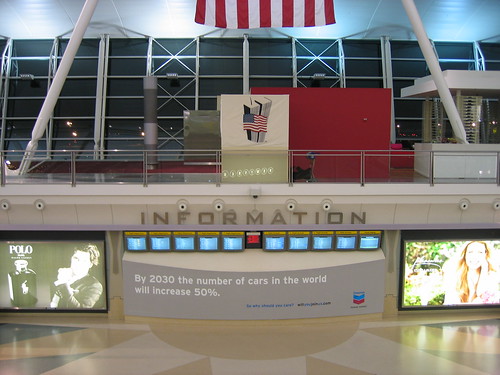
i have spent my time here walking around lost. not due to lack of personal awareness. simply due to language barriers and people being vague or just not knowing.
My complaint about WSF which i have heard a lot of people agreein, is the lack of organization. We went to one building for a workshop where there was supposed to be 13. There ended up only being 4. Delegates had not shown up and without warning. I am not blaming them. apparently though incomparison to past forums this one is terribly unorganized and all over the place. the workshops are all over the city, and so quite hard to find and get to on time.
The government also put a tremendous ammount of money into entertainment for the WSF and last minute withdrew the promise. Leaving artists and musicians at the airports wondering where their tickets were.
we are leaving tomorrow. so today we are walking around the city picking up memories and taking pictures and talking to as many people as possible.
as i have said before... and really i cant stress enough... everyone is so nice here. We met 3 youngsters on the subway, Daniela, annalee, and pedro. we were trying to get to a punk show. through our broken spanish and hand gestures we thought we were all going to the same place. when we got out of the subway we blindly followed these venezuelans. They took us to an open park right on the street where there was a reggae band playing. and lots of press. and i think every group of people were smoking pot in some form or another. The music was really good and it was such a warm scene to just run into. The band is from jamaica and calles red e band. pronounced red eye band. the press was from a local alternative media stations radio and tv (i think). We met a young man names Ceaser who spoke english very well, and portuguese and french. He studied language at the local university and wants to move to the states to teach. he was really nice and offered to show us where the punk show should be. as we had walked far from where the flier said. we declined his offer and walked off confident that we could find the place-- We ran into 3 punks\ anarchists who were looking for the same space. we tried to speak with them and joined them in the search. for some reason we were having a much harder time understanding them and found out later that they were actually from brazil. They told us that the anarchist scene in brazil is extremely strong and connected and even showed us photos of kids hanging out at a squat. Luckily we ran in alba and daniel who told us that the show had been canceled. of course it had. this is our luck in this country. We went with them and they told us how to get to the anarchist house where a lot of alternative forum events were taking place. and again we were lost when left alone to find the house. Bhav is writing about it so you can read from him.
i think i am done for now. i am sad to be leaving, i havent fallen in love with the city the way others in this group have... i am very happy here though, and still believe that i have a lot more to learn. I will learn spanish and come back with the ability to really talk to people. i am just craving tofu. and my cat. and some sound sleep.
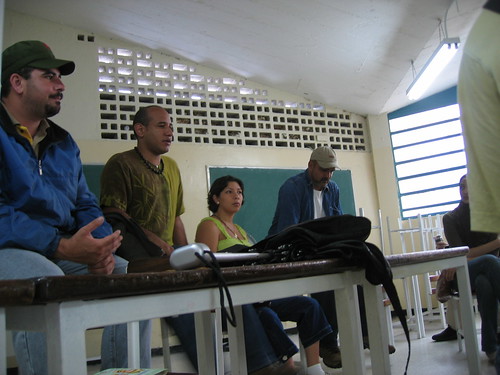
Gustavo, his wife, our translator, and a community leader.
Today we went to the barrio 23 Enero. I have mentioned it before on here, as it is spoken of often in Venezuela. It is spoken of with some sense of dread (the farthest part of the wrong side of the tracks) by the Caracas bourgeoisie. This is the reason that we were told, "be careful in Caracas, they kill white people there." This was merely, on reflection, more disinformation from the right wing of the opposition in Venezuela. The barrio 23 Enero is one of the poorest parts of the urban population in Venezuela, with its own military forces and a decidedly fervent attitude of self sufficiency. The military forces are not a mark of lawlessness (in fact we did not even see them), but more likely a home grown response to and replacement for the classist police that brutalized and tortured the population up until recently.
The entire barrio is the single greatest manifestation of postcapitalist society I have ever seen or even heard about. Cuban doctors live in the neighborhood, with the entire staff volunteering out of thanks for the service provided. Free dental, orthodontal, and vision care is provided through similar avenues. A community radio station now exists where a particularly brutal police station oce stood. Here is a picture of the space today.
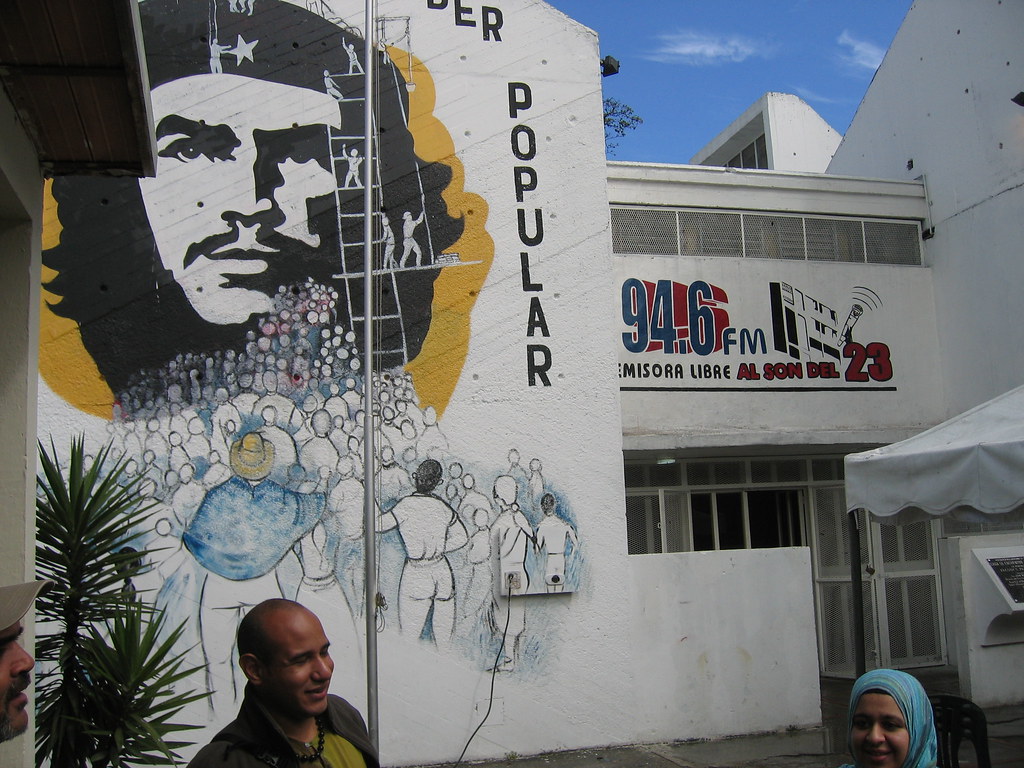
Walking through the winding precipitous back alley stairways and navigating our ways through houses stacked upon houses in an almost Dr. Seussian fashion, we came upon a gentleman cooking soup for the community. I could have easily fit inside of this pot of nutritious and fresh food.
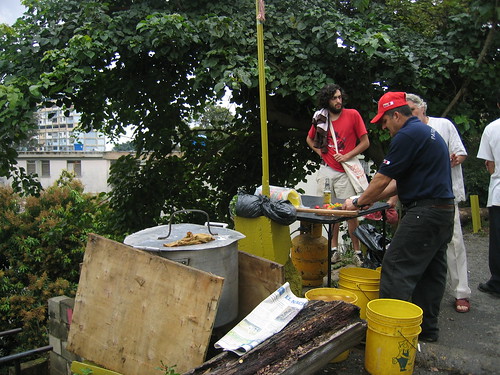
The volunteer community organizers have established gas lines for cooking in all the houses, and clean water for drinking. Transportation collectives provide mobility throughout the city and beyond. Impressive sanitation is provided on a volunteer basis. Education is provided day and night in Bolivarian schools that serve the citizens of the 40,000 person barrio. A mural brigade beautifies the walls of the neighborhood with heroes of the revolution and symbols of the struggle they wage. All of these task are done in addition to the day jobs of the people. As an organizer stated, "you might say that the community is our hobby."
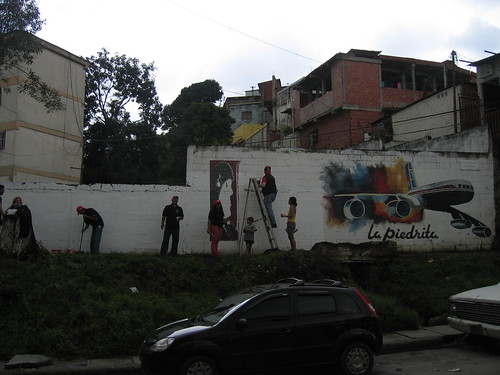
There was a distict lack of anger amongst the community members. And they had a lot to be angry about. Recounting the events of the April coup (made popular in The Revolution will Not be Televised), our friend and guide Gustavo Borges said "the cops...they started shooting at us. But, we shot back." Police agression serving anti-popular interests, a historical marginalization of a community reknowned for the indefatiguable leftist spirit, and a lack of representation would be enough for rage to replace determination, but in this case it did not. Each issue was dealt with methodically, with painstaking detail and grave committment. The police, national guard, and militia still exist in the barrio, but under Chavez and thanks to the community, the problems have greatly lessened. The community now operates as a model of DIY Bolivarian Socialist spirit for many throughout the country and continent. And finally, the barrio has won representation.
Regarding the fight for representation, the people of the barrio were long denied national ID cards for reasons almost identical to the anti-immigration sentiments in the USA. "Immigrants will just come and get free services if we give everyone ID cards!" Bullshit. Without ID cards, the people of the barrio could not vote or make use of national services. Now they finally exist in the eyes of the country, replete with the rights garanteed under the new constitution. An interesting aside, the new constitution REQUIRES half of the congress to be women. It also allots permanent seats to indiginous people to provide much needed representation (not to indicate indiginous people are ever treated as they should be, but it's a step.
There is no cynicism, no snarkiness, and no meta-programming via insidious media campaigns to taint the beautiful sentiments one experiences in the barrio 23 Enero. The socialist syndicalism taking place is not party politics, it simply makes the most sense for these people. It allows the greatest amount of good to be done for all. People helping people in a humble, methodical, and definitively human manner. Gustavo tried to convince us they were not "revolutionaries or guerillas, but rather just people." I have never seen anything more revolutionary than this worldview-crushing display of promise for the future. Gustavo and his wife are selfless servents to the spirit of their revolution, and two of the most beautiful people I have ever been priviledged to meet.
Please visit www.el23.net and learn more about this place. The web design is incredibly slick.
---this is an entry that Jade lost and now is found, reposted by me---
There is lot, in fact far too much, to say about tonight`s event with President Chavez, so I will try to keep it somewhat brief in order not to overwhelm myself or the reader. I believe that entries by others will fill in some of the blanks. That said...
He began unleasing his two-plus hour long word hoard with a series of salutes to the gone and current heroes of Latin American and Caribbean emancipatory, independence and anti-imperialist movements. A number of the names mentioned were more well known to me than others; Bolivar, Amaru, Zapata, Poncho Villa, Sandino, Marti, Fidel, Che and many more I cant recal or do not know were payed homage by Chavez and a roaring crowd of probably 5000. Chavez, as you may or may not know, is a very rousing speaker and as such his profound praise to revolutionaries and yelling rhetorical fits of excitment when denouncing Mr. Danger, the Empire and the yolk of capitalist imperialism is deeply moving, and simultaneously hilarious. In him is a charisma rarely seen in politicians from the U.S. that I have have any experience with. He is just the most refreshing sip drank in his context.
Later in the speach, departing from his pre-accepted and predictible praising and denouncing, came a riskier forray into the nature of humanity, impending biospherical collapse, and the systemic nature of the capitalist system and its urges toward death. It was here that he truely began rousing intense feelings of immenence and my ever-increasing perception that Venezuela may very well be some kind of true emerging vanguard of a broad revolutionary transformation of a neo-socialist orientation in Latin America and the Caribbean. Will Venezuela really live up to its ponential of bringing about some socialist version of Bolivar´s vision of a united and integrated southern counterweight to the Empire`s hemispheric hegemony? Those kind of thoughts, in conjunction with Chavez` penetrating rhetoric, were what brought me goosbumps and shivers of the spine off and on throught the speach. The bringing forth of a fundamentally critical insight of capitalism, which he focused on its utter illegitemacy and unworthiness in conducting the human species (with their special and uniquely unique consciousness) in its journey through history, was an overwhelmingly exciting thing to hear. The president even went so far as to uncover the inherrent and unacceptable eco-destructivity of the capitalist order, claiming that unless something drastic was done immediatly there would be no 22nd century because capitalist humans will have brought our whole species, as well as great swaths of the biosphere, to extinction. That`s an impressive thing to hear from a world leader, even if he might be contributing to global ecodestabilization through petroleum exports or allowing deforestation and srip mining to continue in his own nation to. The fact that he even laid bare the claim that capitalism (that taboo term and great unassailable pillar of political and economic discourse) is not an option for our common future and only socialism (that respects diversity, autonomy, justice, and democratic ideals) can achieve a society worthy of humanity was such an unfamiliar and astonishing thing to actually obsorb coming from a democratically elected legit head of state.
Though Chavez is an awesome speaker to watch and it was genuinly amazing to hear his claims, my scepticism of his rhetoric remains. Here I dont want to be taken as whiner criticizing what appears to be a resplendently significant emergence. I have to say I am not entirely sure that I believe that he is fully devoted to hist lofty goals and is willing to fully back his criticizems, though I want to believe it. He really is convincing and maybe I just dont want to get my hopes up to high and have them let down. Will Chavez live up to his wonderous mythology and dangerous denunciations? The proof of it all will lay wherever the puddingy substance of his actions and programs emerge, not in his incredible speaches.
More later, perhaps...
Hello. This is my first post. This is Bhav, by the way, using Freya's account, because I was somehow unable to create an account.
Soon before coming here for the World Social Forum, we heard about another forum taking place at the same time in Caracas called the Alternative Social Forum, which is a more radical, largely anarchist forum, challenging the government and the Forum it was putting on. Unfortunately I haven't been able to attend any Alternative Social Forum events yet, and I'm not so sure that I will, seeing that they are all in Spanish and the chances of there being English translation are slim. But anyway, I find opposition to Chavez very interesting. I'm not talking about opposition from the wealthy minority - there's nothing much to say about them other than they obviously oppose a government that is seemingly uninterested in protecting and increasing their wealth. I'm talking about opposition stemming from mistrust of Chavez in being truley and practically devoted to anticapitalism and anti-imperialism, and being truley able to liberate and help the people of Venezuela. This mistrust is understandable, given the history of corruption in Latin American governments. As Freya said in her post, we learned at the teach-in on Ecuadorean government toppling that in the history of Ecuador as well as in Latin America as a whole, there has been an unfortunately familiar pattern of leftist governments getting elected into office, and then after some time becoming completely right wing.
On the second day of being here, we ran into two anarchists who talked to us about the Alternative Social Forum. Here's a small paragraph from a personal journal that I've been keeping:
---
Yesterday we met 2 anarchists on the street, tabling for the Alternative Social Forum (Alba and Daniel). They were friendly and talked to us a lot and gave us lots of info, regarding the ASF and told us about a punk show happening this week, which I hope we go to. We picked up a pamphlet regarding the forum (El Libiertad). We notices that in the text, a's and o's were often replaced with @ signs, as a way of de-gendering Spanish words. Pretty fucking cool.
---
I think the name of the pamphlet is actually El Libertario, and apparently it has been a weekly anarchist publication since the early 1900's, which is pretty incredible. It has a website:
www.ellibertario.nodo50.org
That punk show that Alba told us about is happening tonight, at 4pm, and we'll probably go. I'm really looking forward to it. It's in Casa de las Nuevas Tendencias (House of New Tendencies), which is an anarchist organizing space. I'd really like to talk to some radicals and better understand their criticisms of Chavez.
On Monday we met three young anarchists near a WSF march. I asked them some things about the anarchist scene and how they felt about Chavez. Luis spoke the most English and also seemed to know the most about the scene and told us a lot. He said that under Chavez, things were definitely going in the right direction. They were very impressed with Chavez's accomplishments involving health care and improvement of housing in barrios. But the anarchists, Luis said, did not trust the state. He also said that many anarchists identified that way for purely fashion reasons, enjoying the label and the clothing fashion that goes along with it.
A few days later we talked to some radicals we met at a pasta shop, and they said that the anarchist scene was largely divided among those who were pro-chavez and those who opposed him. It's all pretty vague. Hopefully I can find translations of some articles in El Libertario and have some good conversations at the space tonight and learn a lot more.
I find the presence of a radical/anarchist scene intruiging and and extremely important in Venezuela. It's great that people have hope and something to look forward to with a leftist leader like Chavez, but placing too much trust in the hands of any state seems extremely dangerous, especially given Latin America's history of its governments buddying up with American imperialists and falling to the right. I have to say though, that the situation is very exciting, and seems hopeful. With so much attention on Iraq, it seems that the US has been unable to maintain its grip on Latin America, and things are beginning to head in a better direction.
Ok, well that{s all for now. We're off to a workshop: Overcoming Psychological and Cultural Obstacles to Post Capitalism. Much love.
i have snuck into the press office again so here is a quick personal take of caracas.
so far i have only made funny mistakes in spanish such as asking where the drunk is when wanting a liquor store and almost telling a man at a cafe that i loved him when i really wanted to say i want.
there is lots of political graffiti- beautiful murals. all over the city which is really exciting and stencils of indigenous folks. the murals tell the revolutionary history of venezuela. and there are always portraits of Simon Bolivar.
the food here is terrible (at least for a vegan). we have been surviving on lo mein , con vegatables, and arroz y platanos y yuca. and pizza and macaroni napole. and thats it. O and chick peas in a can. the black beans have meat in them and EVERYTHING comes with queso.
But i have laerned how to say what i want to eat. and the people here are very nice. we also are eating cachappas which is a corn pancake. and arrepas which are made from corn meal
the actual wsf is kind of hard for me as I dont speak spanish or portugeuse. most of the workshops are in spanish. so there are very few in english and they are hard to find. it is also extremely disorganized, when they say a workshop is in one sala at one time they ones we seem to want to go to have been moved or the delegates have not showed up. we have made good connections though. We met activists from NY who do Cuban solidarity work especially for the Cuban 5. When hearing that Bhav and I went to Bard the guy got really excited and said, that we should stay in touch and he would send speakers to Bard. so that is a plus. I doubt many people know about the Cuban 5.
we have met some anarchists on the street and talked with them about how they feel about chavez. there is a big divide yet we have still to meet the anarchists who are anti-chavez. most of them believe that he is at least a step in the right direction. i still would love to meet some people who are in opposition and learn about their beliefs. Chavez has a military background, every other president in south american history with a military background ended up more right than left, as far as i know, so it will be interesting to see where chavez takes this country.
we are at a new youth camp. one that is in the down town of the city. so it is very convenient. although the sleeping conditions are in a way a lot worse. there was a dance party (i think on the street) until about 7am this morning. which is crazy. and people here dont seem to sleep. the spanish people in the tents behind us were still drinking aguardiente at 7.
everyone is very friendly. bhav and i walked around last night, aguardiente in hand to go and here music. we ended up being stopped to talk to people, share drinks, stories. and learn what venezuelans think of the govt here, as well as abortion and homophobia. we never made it to the music.
today we are going to a workshop put on by michael alpert about the psychological affects of capitalism and how to counter the negative in a post-capitalist society. He is the guy who runs Zmag and Parecon.
its about 80 degrees here with the sun out, although it is raining a lot. we moved camps to escape the mud but it seems that now we are just going to be swimming in deep puddles. everything in the tent and all are clothes are either wet or damp. but i guess that is camping for you.
everyone here is so friendly, i said that to a venezuelan i met last night who doesnt live in the city. His name is Luis. He was very suprised that people were so nice to us. He also said that he didnt feel safe in the city at all. and that i should be very careful. I have been careful, not really going places alone but i still have not felt scared really. we have met a lot of folks from caracas. alot from quebec. one from chile. brazil. some from australia, and england.its hard to tell if people are nice and chatty because we are in the same space, working for similar goals, or because they are actually that genuinely nice.
anwyay. i shall go. I am not really looking forward to returning to Bard. I heard that it is cold and snowy. My body immediately adapted to the tropical weather and am even wearing jeans and a hoodie here when it drops into the 70s.
bye for now.
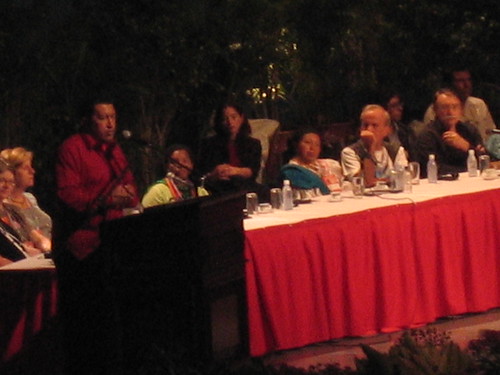
We have just returned from seeing Hugo Chavez address a crowd that filled a domed structure of comparable size to the old Philadelpia Spectrum. The speech was almost two hours long, with topics ranging from the applicability of Marx, Luxemburg, and Bolivar to the modern day, to the ecological crisis incurred by global capital. Mr. Chavez even sang a song in the middle of the speech.
One of the easily predicted main points of the speech concerned George Bush, who Chavez has nicknamed "Mr Danger." Chavez revealed to the crowd that the US plans to formally list Venezuela as a sympathizer with terrorists starting this year. After dicussing historical US imperialism in Latin America, Chavez discussed the current US empire and its similarity to empires past. Here is a paraphrased account:
"This is the most powerful, deceitful empire that has ever existed. The Romans, Alexander the Great...they operated all the while acknowledging that they were empires with the distinct goal of perpetuating their empires. The US operates as an empire, at the same time talking about human rights. Where are the human rights of the Cuba Five?"
After recognizing the amazing power and even the intelligence of the US, Chavez reminded the crowd of the landmark defeat of the FTAA at Mar del Plata. This, he said, portends an age in which the solidarity of South America (which will also extend to its historically linked brother Africa) will prevent the exploitation of the land and the people, while preserving the identity and dignity of a continent. ALBA, the Bolivarian Alternative to the FTAA will unite the continent in a manner that will prevent hegemonic and imperialist interests by its very nature. The Bolivarian revolution will provide true democracy, democracy of the people, and the people will take the offense.
This was an incredibly empowering speech. Ever since seeing his speech to the United Nations, I have been constantly impressed by not only his rhetorical abilities, but the craft and sensitivity of his sentiments. Rather than vilify an entire country, he talks about the of hope he sees in the people of the United States as a force for cahnge from below. He appeals to the power of the Catholic faith in Latin America and the Bible's overriding sentiment of service to the poor, rather than damning his opponents with the same religion. Change is necessary, he claims, change that will allow the human species to carry on. He claimed that it is a romantic, but pessimistic notion to expect peace only when the human race has died out. A new, revitalized socialism can bring us into harmony with the environment, with each other, and our true humanity...all of these things are countered violently by capitalism and its insatiable urge to expand and the destruction of its own means of production. This is true in the long run for an ecosocialist endeavor, but his current oil exploration throughout Venezuela and the indiginous peoples it has displaced takes some of the green out of the rev.
After making the caveat that he respects the autonomy of all groups involved, he explained that he believes (and I am sure the overwhelming majority of us agreed) that the timetable for change must be shortened. The liberation struggles of Bolivar, Lenin, and Guevara never had to contend with assured destruction through climate change. This sounds oddly familiar to train of thought many people reading this may have encountered before.
Through eventually liberating the people of Venezuela from the predatory empire, and thus setting a standard for the future, he shares the vision of the World Social Forum that "Another World is Possible." We must however, act quickly to start making that change, for we're racing capital's expansion and the physical obstacel of dramatic climate change. If anyone fluent in Spanish is interested, I have a recording of the speech I can mail or hand to you upon my return to the states.
When we entered the building, after having two socialist bottles of water forced upon each of us, we were frisked and stripped of any weapons. Adam and I had our multitools taken and placed in a community bin with the assurances that they would remain there until we exited the building. The bummer is, they weren't... but I did run into Scott Beiben from the Lost Film Fest almost immediately upon leaving the building. This assuaged my ire I had been projecting towards the Venezuelan Military, with whom I had an entirely unremarkable relationship prior to this evening.
Sorry this is the 1st blog, i snuck into the press office to do this for free. I want to report back about the 2 good events i have been to. Bhav and I finally managed to find a workshop in english and it was amazing.it was about gov´t toppling in equador. this was on weds. at the central university of venezuela. we went to the door to ask if there would be an english translation and one of the co-hosts for the workshop excitedly dragged us in. He made us make a circle with the chairs so that it was a much more relaxed atmosphere and had us all introduce ourselves, making funny jokes with everyone. The workshop focussed on the recent govt of 2005. A leftist ex-military, president was elected and within the 1st month of his term managed to change his politics towards the right, while still maintaining a seemingly left position. When the indigenous people of Equador began to realize that they were being oppressed by his new agenda they began to stir up. In order to keep them quiet this president Lucio, sorry didn catch the last name, took food out of a food fund for children and gave it to the indigenous people. A radio station exposed this and other various forms of his trickery and called for a rebellion. People gathered and organized, and marched on the palace to oust Lucio. He was helicoptered out to a plane. Thanks to cell phone technology and text messages people were able to stop him from getting on the plane. he was then taken to Brazil and Lula kept him safe. He would have been killed by the enraged people had he stayed. To date there has been no election but one has been scheduled for this year, at the moment the vice pres. is in power. This has happened every 2 years for a very long time in Equador and similar stories have been told of countries all across South America, Lula, right now in Brazil is up to the same trickery. Venezeula is the 1st country to have broken this pattern with Chavez. Though chavez still comes from a military background so who can be sure what he is up to? Gregori mentioned a manifesto that he and others have written, it is establishing the desire for a new form of govt as it has been proven that democracy does not work in South America. Chavez paid for free copies of this to be printed but unfortunately we were not able to find them.
Today we went to a talk about the struggles of women under patriarchal neo-liberalism. It was interesting. There was a woman from El Salvador speaking about women workers, and how they are oppressed and mistreated. Then a woman from the US who spoke about how the reaction or war oppresses women, and women fighting against US imperialism. The next woman was Cindy Sheehan, this was great that she spoke though she didnt have that much to say just emphasizing how war, especially the iraq was, is causing a great amount of suffering in women across the world not just the US and Iraq. Then a Palestinian woman spoke, she told us about being a refugee her whole life in lebanon, and how she has never been to Palestine. As well as the strong US involvement in the occupation of Palestine, as well as the how the occupation makes it difficult for women to have access to education. There is a big struggle for Palestinian women to keep their dignigty and identity. Next was a woman from Colombia, who spoke about women being battered by IMF policies and how war is especially destructive for women, giving the ex. of how the female body is a bounty for soldiers. Then an american from ANSWER as well as the Cuban 5 solidarity group. She was all over the place speaking of 13 yrs of sanctions on Iraq are responsible for the degradation of the country. She spoke about the poverty in the US and the racism that is hand in hand with Katrina relief. Then was a realllly strange documentary trying to tell the story of a cuban girl who is the daughter of one of the cuban 5 and who has only seen her father one time, as he has been in jail for 7 years in Miami, for being a spy. There was lots of strange links to John Lennon which was funny. After this her older sister spoke. She stressed how hard it has been for her family. Her sisters growing up without a father. And how even her mother has been arrested, She also talked a bit about how hard it is for Cubans to go back and forth to the US to see their families, sometimes unable to get visas for over a year.
O and the most exciting part was at the end. Obsession- a cuban Hip Hop duo performed a song about the Cuban struggle, with really funny translations through our headphones.
k bye!
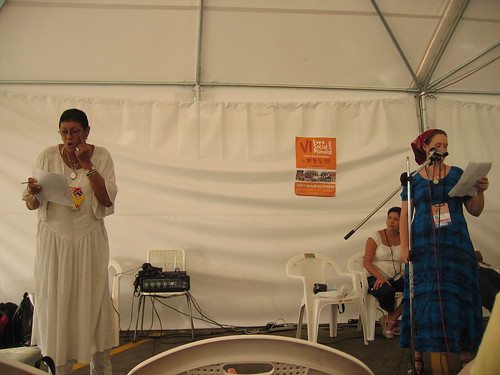
April Howard (Bard BA, MFA) translating for Tereza Valdez
Many issues raised during the forum focus around media reform. A ubiquitous sentiment among the press is the power of the internet to democratize means of publication and allow a worldwide audience access. A worldwide audience that can afford access to the internet, that is. (One way around this would be Nicholas Negroponte's much talked about $100 laptop for the developing world. This product has always chafed me in a wierd way) After seeing a speech today by the man who runs the incredible http://www.el23.net/ I was reminded of the overwhelming power of a media that can broadcast the goings-on of a barrio in Caracas that had been ignored for all of recent history, and feed/create an audience that cares. The internet is so incredibly powerful, and should never be taken for granted, or for normal at that.
Today, Bard alumns Ben Dangl and April Howard moderated and translated a panel called "The Crisis in US and World Media and the Growing Movement for Media Democracy." THe panelists were Eva Golinger (whose FOIA request revealed the US involvement in the recent coup against Chavez), Michael Albert (Editor of Z Magazine and author of Parecon), Greg Wilpert (runs the blog www.venezuelanalysis.com, and broke the media silence during the coup), Ben Dupuy (Haitian free presser and wonderful speaker), and Thereza Valdez (runs community radio stations in Cuba). This was a wonderful panel that we will have a complete video recording of soon after returning to the states.
We interviewed Michael Albert after the panel in a brief but content-rich five minutes. He stressed the importance of thinking of media institutions in the same mindset as we would think of any labor institution. Lose the hierarchy, make sure there is no owner, and make sure that there is no discrimination, and you have a truly alternative media organization, car company, or any business you would like to form. He also stressed the importance of including the mainstream media in change, and not simply creating alternative alcoves that can serve only those involved or an interest group. It was nice to hear the editor of such a well regarded magazine be so critical of the nature of its success, and its failings as an institution for change.
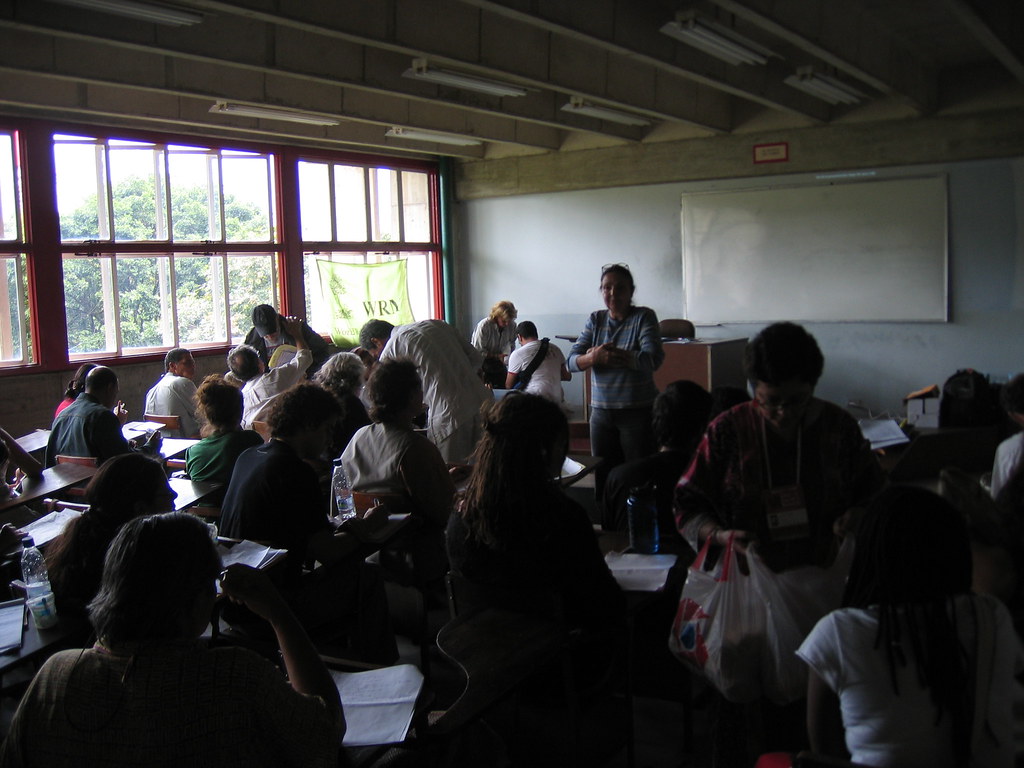
Yesterday we arrived at the World Social Forum Youth Camp after an extremely frustrating registration process that took place among many locations scattered throughout Caracas. The camp is of a higher altitude that provides a nice break from the hectic streets where we spent the first four nights of our journey. It is extremely encouraging to see people from all over the world be put in such a living situation and lose the apprehension and separation that results from differences in language and culture. Being at the camp also provides a better idea of what the coming days may have in store for us as far as what kind of people we will be sharing ideas with. The scheduled events for the forum officially begin tomorrow and we will divide up to most efficiently cover what is going on at the WSF. It will be interesting to see what perspectives will become dominant among discourse considering the wide array of people who are here. I suspect that the days ahead will bring great amounts of content to this website.
In the International Youth Camp discussed by Jade, I had the pleasure of interviewing four leaders of a Communist Movement in Education. The interview took place in the camp, not far from a lively celebration of the 23rd of January. An incredibly generous Venezuelan translated the entire ordeal in an amazing feat of mental stamina (he also asked that I do not give his name, in fear of US retribution...more on this later). The interview lasted about 40 minutes, but was part of a longer two hour discussion of US Foreign Policy in Latin America, the activism and (international) political savvy of the American public, and a long session of fielding questions from all four of the interviewees, the transaltor, and other campers that happened to be walking by.
The interviewees were from a poor section of a city in Venezuela (the name escapes me now, but the interview will be transcribed for publication in college newspapers). Their ages ranged from 25 to 40, and were able to attend college part time thanks to Chavez's Mision Ribas. The Misions are socio-educational projects to benefit the poor that have until now been entirely left out of the Venezuelan educational system. The government sees these programs as a step towards the eradication of the former system of education that marginalized the poor and rural peoples. In 2004, 1.4 million people were enrolled in the Misions, either attending higher education financed entirely by the state, learning English as a foreign language, learning to read, or attending elementary or high school. The Mision takes its name from Jose Felix Ribas, one of the much beloved Simon Bolivar's generals. Ribas once said “We cannot choose between victory and death. Victory is essential.” This imperitive sentiment carries over to the education of the poor, which is intended to prepare those who have never taken part in the democratic process to join in head-on.
They also explained initiative in farming, such as the encouragement of urban permaculture, organic farming and breeding to mimic Argentina's famed beef, and the the self-sufficiency the food production of Venezuela hopes to achieve. Tuna fish, rice, different types of vegetables, beef, and chicken are all intended to be entirely produced in the country, for consumption within the country. This change is already taking place. The "heche en Venezuela" that adorns much of the food and goods remnids me of the long-dead "Made in America" tags that disappeared entirely with the advent of inexpensive and attractive globalized trade and the foriegn exploitation that it entails.
Culture is not left out of the revolution either. For every one foriegn song played on the state radio stations, two songs produced by Venezuelans must be played. The state run TV stations. I was told that rather than leading to repetitive programming, this initiative has encouraged art production at a rapid clip, leading to a surge in home-grown creativity. Also, television shows from the US that vilify blacks and hispanics as "the bad guy" cannot be shown anymore. The racism works for white America, but not for Black and Latino Venezuela.
The four students were shocked by the sterilized media of the United States, in so much as the overwhelming majority of the US population has never heard of Plan Columbia, the Endowment for Democracy, or the real substance to the Bolivarian Revolution in Venezuela. They asked about censorship and spying, and I explained the matter of the recently revealed NSA and FBI domestic spying horrors, at which time they all agreed that I cannot reveal their names in print for fear of retaliation. They did however invite the NSA to trek down to Venezuela to try and find them, and meet whatever fate they will find.
It was in this interview, and not in the relatively wealthy sections of Caracas that I saw Bolivarian socialism. It is a process, and not anything of a quick fix. People who were critical of Chavez, but tirelessly committed to the revolution they have been working towards for decades. They said that in Venezuela, socialism cannot die, it will just flee to the hills to return another day. This sobering, passionate committment to change left me speechless and made me realize how far consciousness has to change in the US to achieve meaningful, large-scale change. These four people thought in such a wide scope, from the bare necessities of day to day life in Venezuela and how to provide them, to the acute dissection of American capitalism and neoliberalism in both systemic and specific terms.
The interview was very comprehensive, and I cannot do it justice here. It will be uploaded for play on the internet as soon as possible, which may be in a week or more.
If you walk around Caracas and use the slightest bit of imagination, you are in Philadelphia, New York, or Trenton. The city itself seems to have kept on its same track with no break for the movement toward Bolivarian Socialism. In short, the city is getting ready to get ready to change it seems. This may be very ill informed, but the impression I have recieved from a few citizens (with various levels of help in translating) is that the change in worldview and operating guidelines that would accompany a socialist revolution has not hit the people in the city. This does not sway the possibility of a true and profound change taking place.
Chavez´s detractors (not nearly as ubiquitous as the signs of his supporters) seem to come from two camps, both equally predictable. The first camp is the Venezuelan bourgeoisie, made popular in the fine film ¨The Revolution will not be Televised.¨ The second camp is the seemingly robust contingent of anarchists living in the country. They are not simply knee-jerk reactionaries to any form of the state, but intelligent, informed, and passionate young people who are presenting the Alternative Social Forum this year. The ASF starts on 23 January, the date the last dictator fled the country, and also the name of a particularly active barrio popular. I plan to participate, but am sure that my decidely poor spanish will prevent me from fully experiencing what the event has to offer.
Yesterday we took a trip to the beach, spending our time in another local that it was blatently clear that gringo tourists rarely go to. The beach itself was the most polluted I have ever seen, with the bay acting as a de facto garbage can. This was surprising, because Caracas is relatively clean, and I have observed several people cleaning up public sidewalks and such. Anyhow, the locals were enjoying the warm Carribean on a misty 80 degree day, so we followed suit. We were greeted warmly by all those who came up and talked to us, offering us drinks and other kindness. After a romp in the waves, we supped and returned to the bus corral to catch another 3 hour ride through the country. We ended up waiting for more or less 4 hours, then found an opportunistic driver charging 10,000 Bolivars for the ride (about $ 5US). We are about to check into the International Youth Camp and leave the Hotel Waldorf and the comforts that 20,000 Bolivars a night can affort (not that Waldorf).
Expect some media in the near future, as we hope to consumate our press registrations and gain access to higher speed computers reserved for the press people.
Six of us have landed safely in Caracas. After a harrowing but beautiful taxi ride through the mountains, we found our reservations at the Hotel New Jersey nonexistent. After a little worry, we found other room, and have since been wandering the streets and enjoying the people and atmosphere. It is a fast paced city, with nice nooks of quietude in the many parks. More later.

The majority of us are setting out on Thursday the 19th. This gets us to Caracas a few days before the forum in which to explore and learn about the city, the country, the people. However, I do not know what kind of internet access there will be, so regular posting should begin on the 24th.
In other news, The main viaduct that serves to transpot people from the airport and elsewhere to Caracas has been closed due to seismic activity that has compromised safety. The (borrowed) gratuitous animation above depicts a likely collapse. This means that travellers will be treated to a more scenic route through the mountains. The Venezuelan government has opened a route specifically for passenger vehicles during specific hours of the day in order to accomodate the large number of WSF participants.